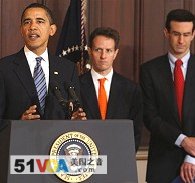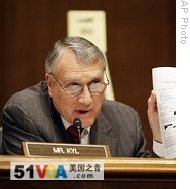Washington
01 March 2009
 |
| President Barack Obama, accompanied by Budget Director Peter Orszag (R), and Treasury Secretary Tim Geithner, speaks about 2010 federal budget, 26 Feb 2009 |
President Obama says the American people elected him to tackle urgent needs, from promoting energy independence to reforming health care to boosting educational opportunities, and his three-point-five trillion dollar budget for 2010 makes a down payment on those goals.
The White House projects a record-high deficit of $1.75 trillion for the next fiscal year, more than 12 percent of U.S. gross domestic product, the biggest proportion since the end of World War II.
Republicans are aghast.
 |
| Senate Finance Committee member Sen. Jon Kyl, R-Arizona, during a hearing on Capitol Hill in Washington (File) |
Republican Senator Jon Kyl of Arizona spoke on the Fox News Sunday television program.
"This budget adds more debt to our country's future than all of the debt from 1789, when George Washington was president, through Franklin Roosevelt and Lyndon Johnson and George W. Bush," he said.
While defending massive short-term deficits as necessary during a severe economic recession, President Obama says his budget will shrink the revenue gap in subsequent years by eliminating unnecessary spending and raising income taxes on the wealthy.
But Republicans note the president also plans a new tax regime on energy consumption that will affect Americans of every income level. They say there should be no tax increases at all while the economy is in free fall. Once again, Senator Kyl:
"Tax policy should provide what the government needs without harming the economy and American families," he said. "Today, the $250,000 [earners] and above pay 60 percent of the income taxes in the United States. So how much more do you want this top two percent to pay?"
But White House officials point out that President Obama inherited a substantial federal deficit from the previous administration, and his budget includes a tax cut for all but the wealthiest of workers.
White House Chief of Staff Rahm Emanuel spoke on CBS' Face the Nation program.
"Ninety-five percent of Americans will have a tax cut," said Rahm Emanuel. "Nobody will see a tax increase for two years."
Emanuel added that the tax rate paid by top earners will return to the level that existed during the Clinton administration in the 1990s, a decade that saw tens of millions of jobs created in the United States.
Other administration officials argue it is unfair to focus on future tax increases without taking into account components of the Obama plan that will benefit broad sectors of society. White House Budget Director Peter Orszag appeared on ABC's This Week program.
"Let us also count the benefits that families get through Pell [education] grants, the benefits that they will receive through constraining health care costs, the benefits they get from weatherizing their homes, and so on," said Peter Orszag. "This budget makes the vast majority of American families much better off."
Last month, President Obama secured congressional approval of a massive economic-stimulus package. The backing of three Republican senators proved critical in winning passage. Whether the president can once again attract some level of bipartisan support for his proposed budget remains to be seen.